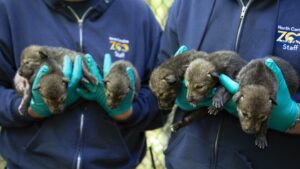 The North Carolina Zoo is asking the public to vote for names for six new-born American red wolf pups.
The North Carolina Zoo is asking the public to vote for names for six new-born American red wolf pups.
For the first time in two decades, this red wolf litter was born on the wolves’ public habitat, giving Zoo guests a rare chance to view the pups for a limited time. Most litters are born in the red wolf breeding area, which is an area of the Zoo closed to the public. The parents of this litter (four females, two males) are Flint (male) and Sassy.
Members of the public can cast their vote for their favorite name among the six chosen by the Zoo’s red wolf keepers. The names are based on rivers in the Southeastern U.S. where critically endangered red wolves used to range.
The names to choose from are: Catawba, Edisto, Haw, Harper, Warrior, Eno, Fisher, Pearl, Waccamaw, and Swannanoa
Voting closes Monday, June 28 at 4 p.m. (all EDT). The public can access the online poll through the Zoo’s website at nczoo.org or through the Zoo’s social media channels on Facebook, Twitter and Instagram. There is no charge to select names. The winning names will be announced on Wednesday, June 30.
The pups were born as part of the Zoo’s red wolf breeding program. There were three litters totaling 12 pups born during three days from April 28 to April 30 (the other two litters pups’ names will be announced soon). This brings the number of red wolves currently in the Zoo’s breeding program to 35, making it the second-largest pack in the U.S. after Point Defiance Zoo and Aquarium in Tacoma, Washington.
Only 15-20 red wolves remain in the wild, and they’re all in eastern North Carolina. Red wolves are considered the most endangered canid in the world.
Once common throughout the southeastern United States, the wolves were driven to near extinction during the late 1960s, but the U.S. Fish and Wildlife Service began an aggressive conservation effort – the American Red Wolf Recovery Program – that led to new ways to track and protect the species. Those efforts led to increasing numbers of wild red wolves in eastern North Carolina, but changes in how the recovery program was managed have resulted in the wild population again plummeting in recent years.
The Zoo has been part of the American Red Wolf Recovery Program since 1994 and led the successful efforts to have the American red wolf become part of the Association of Zoo and Aquariums SAFE (Saving Species From Extinction) program.
AZA SAFE Species programs aim to protect endangered species around the world. For more information, visit https://www.aza.org/aza-safe.
To learn more about the North Carolina Zoo and our red wolf program, please visit www.nczoo.org
